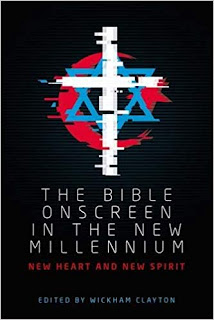Spartacus, Jesus and Moses
 I finally got to see Spartacus on the big screen on Friday, which was pretty incredible. Despite being a big fan of the epic films of the 50s and 60s, this was the first time I had ever seen one on the big screen, and what an experience. It was also only the second time I'd seen the film and I'd forgotten so much of it in the meantime, particularly the extent to which Jean Simmons is in the film and Peter Ustinov's hilarious turn as Batiatus. Incidentally, I got a bit of an epic-movie-geek kick out of the scenes between Ustinov and Charles Laughton because they both played Nero in early-Christian Roman epics, Ustinov in 1951's Quo Vadis and Laughton in The Sign of the Cross (1932).
I finally got to see Spartacus on the big screen on Friday, which was pretty incredible. Despite being a big fan of the epic films of the 50s and 60s, this was the first time I had ever seen one on the big screen, and what an experience. It was also only the second time I'd seen the film and I'd forgotten so much of it in the meantime, particularly the extent to which Jean Simmons is in the film and Peter Ustinov's hilarious turn as Batiatus. Incidentally, I got a bit of an epic-movie-geek kick out of the scenes between Ustinov and Charles Laughton because they both played Nero in early-Christian Roman epics, Ustinov in 1951's Quo Vadis and Laughton in The Sign of the Cross (1932).My two favourite scenes were the build up to the final battle scene - the huge Roman army gradually making its way towards the slaves looked very impressive on the big screen - and the scene with Kirk Douglas and Woody Strode waiting to go into the ring together. Most directors would have gone for the action shot here, shooting the first gladiatorial contest with, perhaps, just an occasional glance at those waiting to go out next. But Kubrick reverses this. He stays with the two men who will go out next allowing us only a very occasional glance at the two other men. The tension and build up here is wonderful, made all the more claustrophobic by the two men being penned in to a tiny shed.
The film is well known, of course, for bookending the story with references to Jesus. The opening monologue notes that this is the century before Jesus, and that it would be his teaching that set the wheels in motion for the abolition of slavery. Of course sadly still exists in the world today, but there's much in this film's subtext that suggests it's much about the founding and development of America as it is about 1st century BC Italy. Then, of course, the film closes with the crucifixion of the heroic, freedom-preaching, rebel leader, which whilst based in real historical events is, nevertheless, an allusion to Jesus as well. It does also shed some light on the practice of crucifixion, most notably the scene were Douglas and Tony Curtis fight to try and kill each other because they would prefer their friend to die by their sword than undergo crucifixion. The fact that they didn't think to stab each other simultaneously is one of the film's few weaknesses however.
Having said all that, I think the film is much more of a Moses film than a Jesus film. For most of the film we are with these travelling, newly-freed slaves, as they seek to organise themselves and escape to permanent freedom. In contrast to the real story, Kubrick has Spartacus march is army down to the sea, and then to get them to march back again. Was this just so he could show the freed slaves trapped by the sea against an advancing army wanting to imprison them once again?
Spartacus also does what The Ten Commandments (1956) rarely does; give an idea of what life on the road might look like for such a large community. DeMille does, of course, show the ordinary people as they prepare to leave their homes in a magnificent sequence, but once the new nation is in motion the details are rather brushed over. Spartacus deals with the need to train his new army, plan a route and make allegiances, but it also shows the people relaxing and eating, caring for the vulnerable and progressing through the seasons. I vaguely remember there being a couple of other points I wanted to make about this as well, but, for the moment, they seem to have escaped me.
=====
Incidentally, the 2010 Starz mini-series Spartacus: Blood and Sand premières in the UK on Bravo on May 25th. From the clips on the Bravo website it looks like the new series is influenced much more by Gladiator and Rome than the original, but given that Gladiator was itself heavily influenced by the Kubrick film I imagine that there will be something or other to link it with the original. There was an interview with one of the show stars, John Hannah, in Monday's Guardian.
Labels: Jesus Cameos, Moses













5 Comments:
At 2:15 pm, May 19, 2010, Centro De Cursos Prematrimoniales said…
Centro De Cursos Prematrimoniales said…
hello there,
I just started a new series of Bible Film study at our ministry (I AM Ministries - The Church without Walls). I really appreciate your work here and look forward in networking with you and your insights on film study.
Thanks again,
Pastor Andy Fernandez
At 9:22 pm, May 19, 2010, Matt Page said…
Matt Page said…
Thanks Andy - look forward to hearing more from you.
Matt
At 8:49 pm, May 20, 2010, Peter T Chattaway said…
Peter T Chattaway said…
Great catch re: Ustinov and Laughton and their shared link with Nero; I don't think that had ever occurred to me before.
At 9:22 am, May 21, 2010, Matt Page said…
Matt Page said…
Thanks Peter,
As I wrote it part of me did wonder if it was something you'd ever noticed.
Matt
At 9:04 am, January 04, 2021, Unknown said…
Unknown said…
just watching this movie 🙏
Post a Comment
<< Home